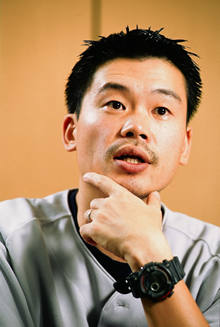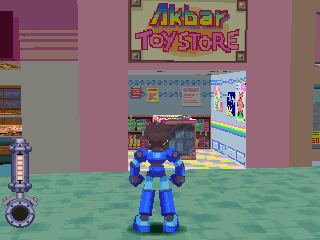
Fez designer Phil Fish has been criticized at the Game Developers Conference this week for his harsh, crass comments about the state of Japanese video games.
Fish isn't a Japanese game designer, however. Keiji Inafune, formerly of Capcom, definitely is.
Inafune was at GDC to discuss the future of Japanese games, and his talk was equal parts introspection on his own work and motivational speech for the Japanese developers in the audience.
"For fans of our games, our country, our culture or people, please don't look away from me. Please don't look away from me," he said. "This is the honest truth that I want to share with you today."
The crux of Inafune's argument was pointing out that Japan used to be a trailblazer, and the country has become increasingly lazy in the years since. Japan needs to have the desire to win, he said.
The motivation to "win" was a central point, a refrain Inafune returned to over and over again.
"Back in the day, our Japanese games were used to winning and achieved major, major success," he said. "We celebrated many victories and walked down all sorts of avenues as winners. However, at some point, these wins became losses and not realizing, acknowledging and accepting that fact has lead to today's tragic state of Japanese games."
Even though fans have come around on Mega Man Legends, it was considered a failure for Capcom at the time. The press wasn't interested in Mega Man Legends, and the sales were disappointing. Inafune put his heart and soul into that game's development, but commercially, none of that mattered. What making Mega Man Legends did, however, was push Inafune to work hard and work through adversity.
"That experience is my biggest failure and biggest treasure in my video game career," he said.
After Mega Man Legends, Inafune worked on Resident Evil 2. He found it incredibly easy to get anything he needed approved for the project, and generating press was effortless. Inafune dreamed about a world where he never worked on Mega Man Legends, never experienced passionate failure, and envisioned a scenario where he was used to being treated as he was during Resident Evil 2, and how that could instill a poor work ethic.
"If you never get your hands dirty," he said, "you'll never be able to understand the nitty gritty details."

He made sure to pay his respects to Resident Evil designer Shinji Mikami, pointing out how the original Resident Evil had development similarities to Mega Man Legends. No one believed in the project, no one was talking about the project, and canceling it was a real possibility. Mikami earned his stripes making Resident Evil, and could better appreciate the freedom in Resident Evil 2.
Inafune pointed outside video games for inspiration on how Japan can transform itself: Apple.
"If Apple chose to stick to the glory of the old days with their personal computers and its operating systems, they probably wouldn't be around today," he said. "Steve Jobs chose to develop the brand and not just maintain it, and that's why the Apple we know today exists."
Leaving Capcom was part of Inafune choosing the hard path, rather than the easy. Comcept still has to prove itself, but Inafune sounded upbeat, happy, and optimistic. He's also developing a brand-new game for the Vita, though he didn't provide any details on it.
Even though Inafune was incredibly critical of modern Japanese designers, developer and publishers, he seemed to do so out of desperation and hope. He wants Japan to be big again.
"Time is running out, and we should have realized this when I made that bold statement a few years ago," he said.